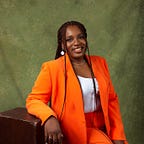How My Christianity Helped Me Embrace My Feminism
On identity and labels
If I walked into a room full of strangers and was required to talk about myself, my introduction would not be complete without stating that I am a Christian and a feminist, amongst other things. I have not always identified as both of these things though.
For some time, I rejected both labels of feminist and Christian. You see, I looked around me and realised that the words and actions of Christians and feminists that I saw, heard of and read about, did not align with my understanding of either ideology. So, I would say things like: “I believe that Jesus died for me but I’m not a Christian” and “I believe that women and men should have the same rights but I’m not a feminist”.
My understanding of Christianity came long before my understanding of feminism. Although I was raised in a Muslim family, I went to Christian primary and secondary schools, where I was exposed to self-proclaiming Christians almost every day. The behaviour and attitudes of these people — especially the adults — did not add up with what I understood Christianity to be about. People would preach one thing and do another. Actions were not connecting with words from the Bible. In my opinion, and from my personal experience with my faith, Jesus’s ultimate message was love; “Love the Lord your God and love your neighbour as yourself” (some might argue that this is a simplistic summary of Jesus’s message, but that’s not what this post is about), but people were judgemental, hateful, and self-righteous and so I started to separate myself from the label of Christian (ironically, this could be read as me being self-righteous).
Sometime towards the end of secondary school, I stumbled upon the word “feminism”. My brother was taking SAT classes and I was reading through his notes (a habit I’ve had for as long as I can remember) and stumbled upon the word. I’ve always been an outspoken person and I have never subscribed to the idea that certain things are for girls only and that certain things are for boys only. So when I found this word that described my belief, I proclaimed myself a feminist.
Enter Twitter. Feminism was becoming a thing on Twitter. My identity as a feminist began to unravel. I began to have the same problem that I had with the identity and label of ‘Christian’. Feminism was getting a bad rap on Twitter. Some feminists had lost the plot. Proclaim yourself a feminist and you would be avoided like a plague. Feminists were angry, bitter, frustrated, ugly, man-hating lesbians and 17 year old me did not want to be identified as these things. I just wanted women to have equal rights with men. I also wanted people to like me. In addition to this internal battle for likes vs saying what I believed, there were the feminists with what I thought to be stupid and unnecessary demands. I was so bothered that I went on a rant on my blog, asking “Am I a feminist?”
One’s identity is an interesting thing because it determines how you interact with people and how people perceive you interact with you. Identities are loaded with stereotypes, true and untrue, good and bad. Our identities saddle us — and others — with expectations. Our gender, religious, political and other ideological identities often define us and influence how we engage with the world more than we’d like to admit. Most people would take disagreement with an ideology they believe in as a personal attack because they have internalised their beliefs.
I embraced my label of “Christian” before I embraced my label of “feminist”. After a long crisis of faith (a result of guilt, depression, and failed hopes and dreams), it occurred to me that in every sense of the word, I am a Christian and even though some people misuse and misinterpret the teachings of the faith, and some people use it to manipulate other people, my belief is my belief and I know the truth of what I believe in. This realisation allowed me to start calling myself a Christian again.
Sometime later, while arguing feminism with some friends, I came to the realisation that I could apply the above logic to my relationship with feminism and identifying as a feminist. What is the root of the ideology of feminism? It is the belief that men and women should have equal rights and access. Basically, it advocates for the social, political and all other rights for women on the same level as those of men. Did I believe in this? Yes. I did and I still do. The point is that even though as an ideology, feminism has been misinterpreted and misunderstood, and there are extremists (as with any other ideology) and misandrists, who hide under the cloak of feminism, and twitter arguments reducing feminism to who cooks, changing surnames, and whether the worth of a woman lies in if she washes clothes using a washing machine or her hands, I know the truth of feminism and I know why it is necessary. So, why should I reject the label?
I have come to understand that no ideology is perfect and as long as we are human, we will interpret anything to suit ourselves. Ideologies are just that — ideas that are subject to interpretation.
If you enjoyed reading this, please recommend :)
